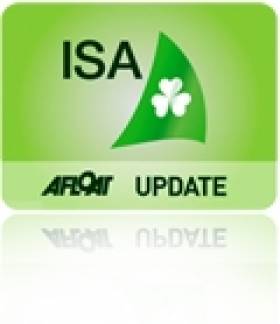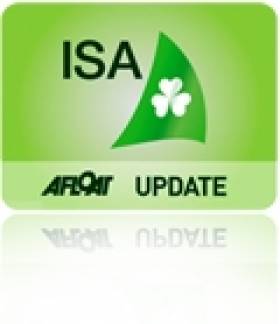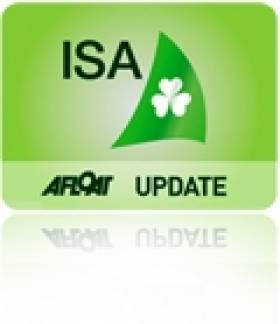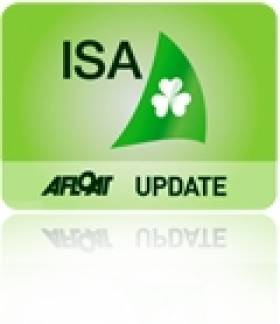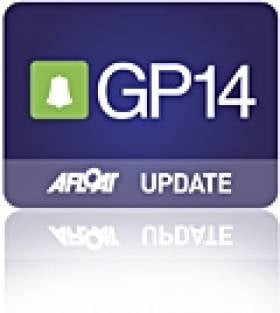Displaying items by tag: Niall Henry
Nicholas O'Leary Produces Hat Trick in All Ireland Re Run
The All Ireland Championships at Kinsale today turned out in the end to be an event well worth the long wait and provided thrilling competition from start to finish writes Claire Bateman. It was sailed in a three metre swell between the Bullman Buoy and Sandycove. It was particularly difficult for the Race Committee under PRO David O'Brien in the continuous undulating swell.

Nicholas and his winning crew Adam McCarthy and Alex Barry in Kinsale this afternoon. Photo: Bob Bateman. More photos on the gallery HERE
After four races the Race Committee were calculating the results only to find that they had three Royal Cork crews tied on five points each including the twice previous holder Nicholas O'Leary, his father Anthony and Niall Kenefick who was sailing with his two sons David and George. And so the competition went down to the wire with the result dependant on the final race. Nicholas O'Leary triumphed taking his third consecutive Championship win, the first ever to do so, followed by Anthony O'Leary in second place and Niall Kenefick taking third place.
This exceptional result finally puts to bed any previous suggestions that local knowledge could prevail in the results by the competition taking place in the home club of the winner.
In his acceptance speech Nicholas said it was very difficult in the first race today to have to protest his father who was coming in on port to the mark but with a twinkle in his eye said it had to be done!
After it was all over one wag suggested to Nicholas that he should now seek to keep the trophy as he had won it three times in a row. The reply should be rather interesting!
Speaking at the reception afterwards the ISA said the three year sponsorship had now expired so they will be looking for new sponsors but such was their confidence in the continuance of the fleet they have already ordered new sails.
Results:
1. Nicholas O'Leary
2. Anthony O'Leary
3. Niall Kenefick
4. Garrett May
5. James Espey
6. Nick Walsh
7. Niall Henry
8. Ewen Barry
All Ireland Champs Move to Kinsale
The re-run of the All Ireland Sailing Championships will take place in Kinsale and not Crosshaven on November 20th according to a press release from the Irish Sailing Association published today.
A minimum of three races must be completed for the competition to conclude and the ISA Helmsman's Trophy awarded.
The final, originally scheduled to take place in Royal Cork Yacht Club on the 26th of September, had to be abandoned due to an absence of wind.
The competition will be sailed in the ISA SailFleet J80's which are currently based in Kinsale Yacht Club. Due to the difficulty in safely sailing the fleet from Kinsale to Crosshaven the venue had to be changed, however the host club remains Royal Cork Yacht Club who are now kindly assisted by Kinsale Yacht Club.
8 teams will be competing for the ISA Helmsmans Trophy. As this competition is recognised as a new event, no previous points shall be carried forward. Each competitor begins with a blank score card.
The finalists are:
Anthony O'Leary
Ewen Barry
Garrett May
James Espey
Neil Kenefick
Niall Henry
Nicholas O'Leary
Nick Walsh
Who'll win? We're starting a readers poll on Monday. Click back to cast your vote!
All Ireland Champs to Sail Again on November 20
After an abandonment due to lack of wind in early October and a long wait for news of a new date, the Irish Sailing Association has announced its All Ireland Championship will now take place on November 20th.The competitors have agreed to be available on this weekend to sail but the announcement on the ISA website does not name the venue, presumably the original location, Cork Harbour. the finalists and drawn boats are:
Final Flight
1. McCann Fitzgerald Anthony O'Leary
2. D/L Marina Neil Kenefick
3. O'Leary Insurance Ewen Barry
4. Smyths Toys Nicholas O'Leary
5. Dyno Rod Garrett May
6. Smart Niall Henry
7. KPMG James Espey
8. Irish Examiner Nick Walsh
ISA Seek New Date for All Ireland Event
Following the abandonment of the All Ireland Sailing Championships at Royal Cork last weekend due to lack of wind the Irish Sailing Association (ISA) has yet to announce dates for the rescheduled event. An autumn date to accomodate all concerned is the objective, the association said yesterday. The eight finalists involved are; Anthony O'Leary, Neil Kenefick, Nicholas O'Leary, Garrett May, Niall Henry, James Espey, Nick Walsh and Ewen Barry.
All Ireland Final Date Yet to be Agreed
Eight helmsmen, including the double winner Nicholas O'Leary will be invited to participate in a new final consisting of five races. The eight finallists are
Anthony O'Leary
Neil Kenefick
Nicholas O'Leary
Garrett May
Niall Henry
James Espey
Nick Walsh
Ewen Barry
Forum Discussion HERE
Sligo Yacht Club hosted the GP 14 Summer Open and Irish Youth Championships at Rosses Point on the 24th and 25th July.
26 boats lined up at the start. Gus Henry, himself a GP 14 sailor can always be relied upon to provide exceptional race management. He called back race 1 after a significant wind change. The race started proper a short while after that. Keith Louden and Dessie Hughes from Lough Foyle Yacht Club got to the weather mark first in 12 knots of wind, followed by local sailors Niall Henry and James Conlon. In third, Shane McCarthy and Al Fry followed close behind in their new boat. Niall Henry took line honours in the race after sailing a flawless race and taking the lead on the second beat. Paddy O'Connor and Tania McHale climbed from fourth to take second. McCarthy and Fry took third.
Race 2 followed shortly after. This time, there was a definite interest by Paul Maguire and Niamh McCormick from Sutton SC in the right hand side as the tide was picking up in pace. Alastair Duffin and Paul Whitcombe from Newtownards SC went that way too but not quite as far out. Shane and Fry chose the middle route, while the Mc Guinness Brothers from Moville Boat Club initially went left and then back into the middle right. At the weather mark, Maguire and McCormick had a clear lead with McCarthy and Fry in second with the McGuinness brothers a short distance away. The McGuinness brothers passed McCarthy and Fry on the second reach. Maguire and McCormick maintained their lead to the finish with half a boat length to spare at the end with the Donegal team a close second.
Race three got under way in similar wind to the first day but this time the tide was going out. The boats that went left looked good initially, but their hopes were soon dashed as the right side of the fleet piled in to the weather mark. Henry and Conlon though, who had sailed a middle course got to the weather mark first with about 7 boat lengths to spare. They let nothing slip and finished with a convincing first. With 1-5-1 in a four race series, they couldn't be beaten and didn't start race 4. The McGuinness brothers won race four taking the lead in the first reach, leaving them second overall. Conor Byrne and Pamela Lee, first time GP sailor were second and O'Connor and McHale finished third giving them third in the event.
The silver fleet was won by Nigel Sloane and Laura McFarland with Gerry Gilligan and Lucia Nicholson in second and Johnny Park and Bob Stinson in third.
The bronze fleet was won by Conor Byrne and Pamela Lee, Wai Manu and Don MacCormack in second and Bill Johnson and Stephen Byrne in third.


























